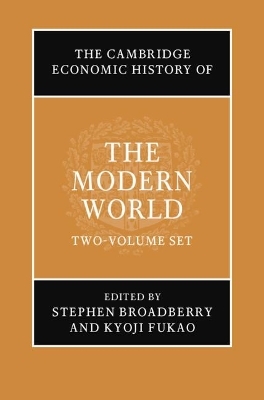
The Cambridge Economic History of the Modern World 2 Volume Hardback Set
Cambridge University Press
978-1-108-95377-1 (ISBN)
The Cambridge Economic History of the Modern World offers an unprecedented global account of the emergence of modern economic growth and its spread across the world since 1700. Each volume provides a series of regional studies from across the globe, as well as thematic analyses of key factors governing differential outcomes in different parts of the global economy. Written by leading experts in economic history and covering topics such as demography and human development, capital and technology, living standards and inequality, geography and institutions, trade and migration, international finance, and warfare and empire, these volumes offer the most authoritative account to-date of modern economic growth.
Stephen Broadberry is Professor of Economic History at the University of Oxford and a Fellow of the British Academy. He has been Managing Editor of the Economic History Review and also the European Review of Economic History and President of the Economic History Society and the European Historical Economics Society. Kyoji Fukao is President of the Institute of Developing Economies, Japan External Trade Organization (IDE-JETRO) and Specially Appointed Professor at the Institute of Economic Research, Hitotsubashi University. He has been President of the Asian Historical Economics Society and has published widely on Japanese and global economic history.
Volume I: Introduction to Volume I Stephen Broadberry and Kyoji Fukao; Part I. Regional Developments: 1. Britain, the industrial revolution and modern economic growth Stephen Broadberry; 2. Continental Europe Giovanni Federico and Andrei Markevich; 3. Tokugawa Japan and the foundations of modern economic growth in Asia Masaki Nakabayashi; 4. China: the start of the great divergence Christopher Isett; 5. From the Mughals to the Raj: India 1700–1858 Anand V. Swamy; 6. Sustainable development in South East Asia Jean-Pascal Bassino; 7. The Ottoman Empire, 1700–1870 Şevket Pamuk; 8. The economic history of North America, 1700–1870 Joshua L. Rosenbloom; 9. Latin America: 1700–1870 Regina Grafe; 10. Africa: slavery and the world economy, 1700–1870 Patrick Manning; 11. Australia: geography and institutions David Meredith; Part II. Factors Governing Differential Outcomes in the Global Economy: 12. Population and human development since 1700 Osamu Saito and Romola Davenport; 13. Proximate sources of growth: capital and technology, 1700–1870 Alessandro Nuvolari and Masayuki Tanimoto; 14. Underlying sources of growth: first and second nature geography Paul Caruana-Galizia, Tomoko Hashino and Max-Stephan Schulze; 15. Institutions John Joseph Wallis; 16. Consequences of growth: living standards, inequality and consumption Jan Luiten van Zanden, Bas van Leeuwen and Yi Xu; 17. International transactions: real trade and factor flows Wolfgang Keller, Markus Lampe and Carol H. Shiue; 18. Monetary systems and the global balance of payments adjustment in the pre-gold standard period, 1700–1870 Rui Pedro Esteves and Pilar Nogues-Marco; 19. War and empire, 1700–1870 Philip T. Hoffman and Tirthankar Roy. Volume II: Introduction to Volume II Stephen Broadberry and Kyoji Fukao; Part I. Regional Developments: 1. North America: the rise of US technological and economic leadership Paul W. Rhode; 2. Western Europe: convergence and divergence Paul Sharp; 3. The socialist experiment and beyond: the economic development of Eastern Europe from 1870 to the present Tracy Dennison and Alexander Klein; 4. Japan: modern economic growth in Asia Kyoji Fukao and Tokihiko Settsu; 5. Economic change in China: the role of institutions and ideology Debin Ma; 6. From free trade to regulation: the political economy of India's development since 1858 Bishnupriya Gupta; 7. Growth and globalisation phases in South East Asian development since the late nineteenth century Gregg Huff; 8. The Middle East: decline and resurgence in West Asia Mohamed Saleh; 9. Latin America: stalled catching-up Pablo Astorga and Alfonso Herranz-Loncán; 10. African economic development: growth, reversals, and deep transitions Ewout Frankema; 11. Australia: prosperity, relative decline and reorientation Gary B. Magee; Part II. Factors Governing Differential Outcomes in the Global Economy: 12. Healthy, literate, and smart: the global increase in human capital since 1870 Latika Chaudhary and Peter Lindert; 13. Proximate sources of growth: capital and technology since 1870 Rajabrata Banerjee, Robert Inklaar and Herman de Jong; 14. Underlying sources of growth: first and second nature geography Paul Caruana-Galizia, Toshihiro Okubo and Nikolaus Wolf; 15. Underlying sources of growth: institutions and the state James Foreman-Peck and Leslie Hannah; 16. Living standards, inequality and human development Leandro Prados de la Escosura and Myung Soo Cha; 17. Trade and immigration David S. Jacks and John P. Tang; 18. International finance, 1870–2010 Barry Eichengreen and Rui Esteves; 19. Warfare and empire Jari Eloranta and Leigh Gardner.
| Erscheint lt. Verlag | 31.7.2021 |
|---|---|
| Reihe/Serie | The Cambridge Economic History of the Modern World |
| Zusatzinfo | Worked examples or Exercises |
| Verlagsort | Cambridge |
| Sprache | englisch |
| Maße | 158 x 234 mm |
| Gewicht | 1970 g |
| Themenwelt | Geisteswissenschaften ► Geschichte ► Allgemeine Geschichte |
| Geschichte ► Teilgebiete der Geschichte ► Wirtschaftsgeschichte | |
| Wirtschaft ► Volkswirtschaftslehre | |
| ISBN-10 | 1-108-95377-8 / 1108953778 |
| ISBN-13 | 978-1-108-95377-1 / 9781108953771 |
| Zustand | Neuware |
| Haben Sie eine Frage zum Produkt? |